Diplomatic Bluebook 2017
Chapter 4
Japan's Diplomacy Open to the Public
1.Overseas Risks and Safety of Japanese Nationals
(1) Incidents and Accidents in 2016 and Countermeasures
In July, a terrorist attack occurred in Dhaka, Bangladesh, where a restaurant was assaulted, with eight Japanese nationals harmed. The threat of terrorism is now spreading from the Middle East and Africa, where Islamic extremist organizations are based in, to Europe, the U.S. and Asia, where many Japanese nationals travel and/or stay. Moreover, many cases of terrorism are seen where the acts are perpetrated by people who have been indoctrinated by foreign Islamic extremism ideology through the internet, etc. (homegrown type) and/or lone wolves, who have little organizational background and act alone, while there has been a tendency for terrorists to target the general public in everyday locations. This is making it ever more difficult to prevent acts of terrorism from occurring.
Other incidents occurring in 2016 that demonstrated this tendency include the January shooting and bombing in Jakarta (Indonesia), the March airport and subway terrorist attacks in Brussels (Belgium), the June shooting terrorist attack at a night club in Orlando (the U.S.), the June terrorist attack on the international airport in Istanbul (Turkey), the July rampage with a large truck at a fireworks festival in Nice (France), and the December assault with a large truck on a Christmas market in Berlin (Germany). There is concern that terrorist incidents will continue to occur at places where large numbers of the general public congregate.
As other crimes, murder incidents involving Japanese nationals occurred in several countries such as the Philippines, the U.S., Canada, Trinidad and Tobago, and Colombia. The incident involving Japanese students overseas include the murder of a Japanese woman in Canada (September) and the robbery murder of a male student in Colombia (November).
Incidents involving Japanese nationals include a mountain-climbing death on Mt. McKinley in June, the tourist bus rollover accident in Taiwan in September, train collision in the Hoboken Terminal in New Jersey in the U.S. in September, a falling accident while mountain climbing in the Himalayan Mountains in Nepal in October, the capsizing of a glass-bottom boat at Sulangan Island in Indonesia in November, and the helicopter crash in Hawaii in the U.S. in November.
Cases of Japanese nationals overseas affected by a serious deterioration of security caused by political instability include two cases in July, one in South Sudan where government and opposition forces repeatedly clashed in the city of Juba, leading to evacuation of Japanese nationals out of South Sudan and the other in Turkey where part of the military conducted an uprising and left Japanese travelers temporarily stranded in the airport.
There have been continued reports of deaths and illness of middle-ages and seniors in the high altitude mountains, the sea, and at hotels. In some of such cases, family members of the victims faced difficulties dealing with expensive medical fees or transportation costs compared to those in Japan, or insufficient medical services.
As for infectious diseases, the Zika virus disease broke out in Brazil and elsewhere in Middle and South America and the World Health Organization (WHO) declared a “Public Health Emergency of International Concern (PHEIC)”. This drew worldwide attention. WHO announced the end of the PHEIC in November, but the infection has spread to parts of the U.S. as well as to Southeast Asia and Oceania among others. Thus, it is still necessary to be careful when traveling to or staying in the infected areas.
Moreover, cases of Crimean-Congo hemorrhagic fever in Spain were reported, and there continue to be reports of cases of the Middle East Respiratory Syndrome (MERS) in the Middle East and human infection with avian influenza A (H7N9) in China and elsewhere. Dengue fever and malaria also continued to spread throughout the world.
MOFA issues “Overseas Travel Safety Information” on infectious disease and air pollution to provide Japanese nationals staying abroad with information on the current outbreak situation and prevention measures as well as with relevant warnings.
(Tips for Traveling and Living Abroad)
As described above, threats to the safety of Japanese nationals have prevailed all around the world. When traveling and living abroad, in addition to “Overseas Travel Registration (“Tabi-Regi”)” or submission of Overseas Residential Registration, the following actions are important: (1) to check overseas safety information beforehand on the Overseas Safety Website or through media reports, etc., (2) to take full safety measures and risk aversion actions to prepare for emergency situations while abroad, and (3) in an emergency, to contact the Japanese diplomatic missions overseas nearby, such as the embassy/consulate-general, and family members in Japan. It is very important for each individual traveler to purchase travel insurance with sufficient coverage as, without travel insurance, expensive medical fees incurred abroad may make it difficult to pay the medical cost or to receive proper medical care.
(2) Safety Measures for Japanese Nationals Abroad
While Japanese nationals play major roles in the international community, there are many cases where Japanese nationals are harmed overseas. The number of Japanese nationals who received support or protection from the diplomatic missions overseas and the Interchange Association has stayed on a high level. It was 20,387 people with 18,013 cases in 20151.
In order to avoid overseas accidents and troubles, it is important to collect information beforehand. MOFA works to raise the safety awareness of the Japanese public and promote counter-measures by disseminating and sharing information on safety measures.
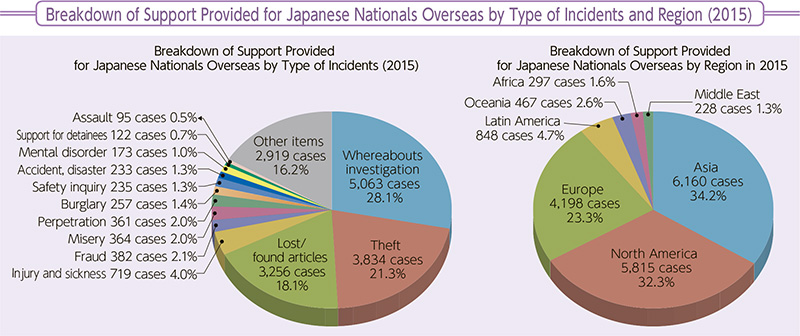
MOFA issues the latest safety information of each country and area on the Overseas Safety Website. Newly issued information is distributed to Japanese nationals staying overseas who have made Overseas Residential Registrations and short-term travelers who have registered to the “Overseas Travel Registration (“Tabi-Regi”).” They also receive safety information issued by diplomatic missions overseas. “Tabi-Regi” is also available to those without travel plans, through simplified registration, and the safety information distributed in this manner is widely utilized by Japanese businesses with overseas operations for their safety measures.
MOFA is also making efforts to enhance the knowledge and capability of the Japanese people concerning safety measures and crisis management through seminars and drills. MOFA hosted domestic safety measures seminars nationwide, and dispatched instructors from the Consular Affairs Bureau to give lectures on safety measures at seminars nationwide conducted by various organizations, associations, etc. MOFA also conducted the “Public-Private Joint Practical Training for Counter-Terrorism and Anti-Kidnapping Measures” with the participation of members of the business community. These efforts not only serve to prevent harm from terrorism, etc., but also contribute to enhance response capabilities in the unfortunate event that someone is caught in an incident.
The public and private sectors are also cooperating overseas to take safety measures. The diplomatic missions overseas host regular meetings of “Security Consultation and Liaison Committees” with Japanese nationals residing abroad to share information, exchange views and bolster collaboration in preparation for emergencies.
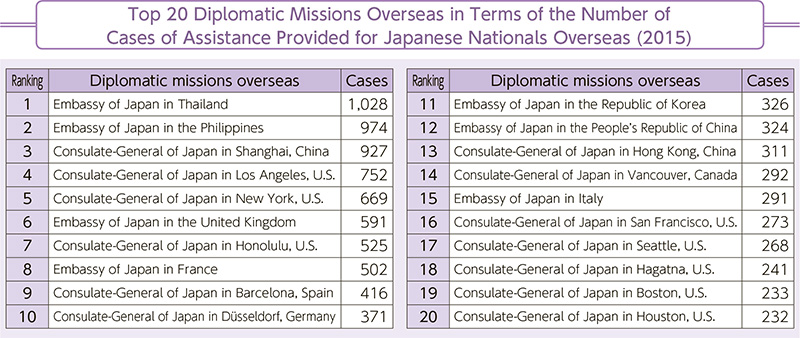
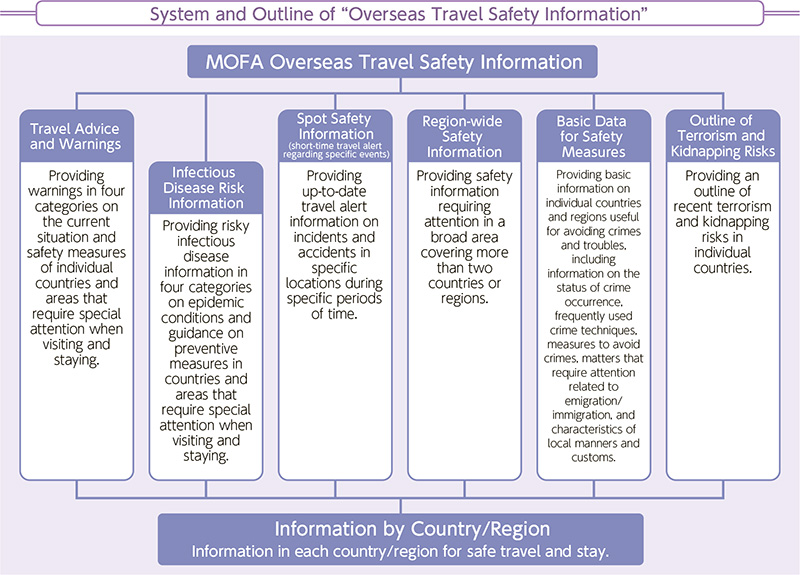
After the July terrorist attack in Dhaka, MOFA has placed particular focus on international cooperation personnel, small and medium enterprises, students studying abroad, short-term travelers and others who have limited access to information on safety. MOFA has worked to enhance their awareness of safety measures and their response capabilities.
In order to support Japanese businesses, particularly small and medium enterprises that comprise their bulk, on safety measures, MOFA launched the Overseas Safety Taskforce together with the Japan Chamber of Commerce and Industry (JCCI) in August and the Small and Medium Enterprise Overseas Safety Measures Network, in which organizations related to the overseas activities of Japanese businesses participate, in September. The aim is to share knowhow and information on safety measures with a wide range of people in the business community and to swiftly grasp and resolve concerns and problems they have on security issues. In addition, MOFA has produced “Golgo 13's Security Guidelines for Japanese SMEs abroad”, and published them as they are completed (See column “Calling on Golgo 13 -Overseas Safety Measures for Small, Medium and Mid-Sized Enterprises-”).
MOFA is working to enhance the awareness of safety measures for Japanese students studying overseas. MOFA sends lecturers to universities and other educational institutions, many of which have insufficient knowhow on safety measures and emergency responses, upon their requests. MOFA is going forward with efforts to connect government agencies with educational institutions, overseas study agencies and students by such means as beginning automatic registration to “Overseas Travel Registration (“Tabi-Regi”)” with some overseas study institutions.
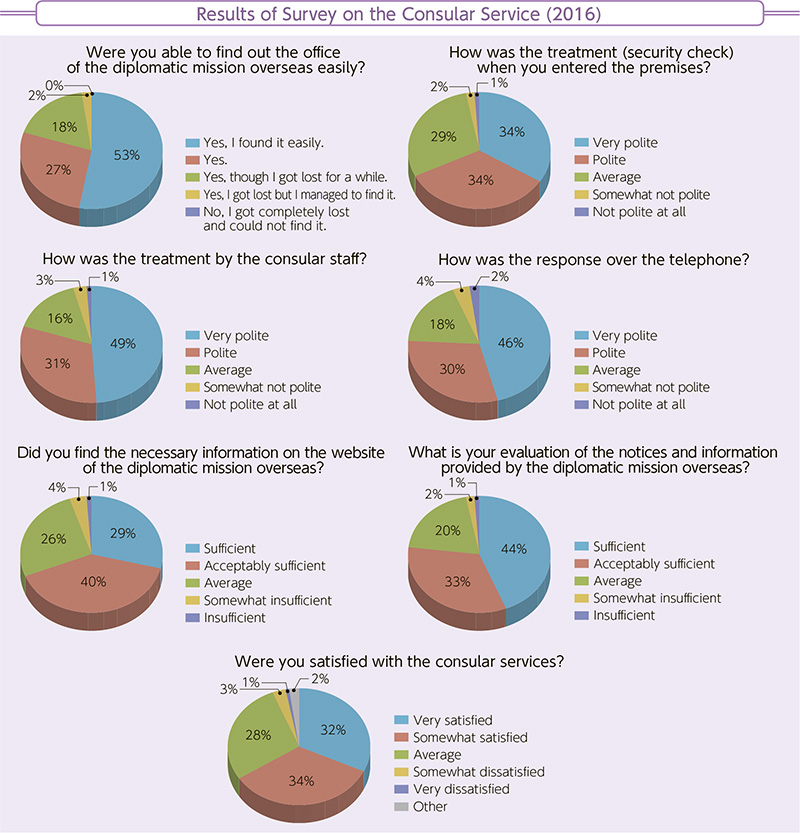
As for safety measures for short-term travelers, MOFA is engaged in PR activities to encourage registration under “Overseas Travel Registration (“Tabi-Regi”).” MOFA is aiming at increasing the number of cumulative registrants to 2.4 million by the summer of 2018. The number of registrants increased from about 61,000 in January 2016 to about 1.49 million by December of the same year.
- 1 The Statistics on Assistance for Japanese Involved in Accidents and Other Incidents, first published in 1986, is an annual report on the number of cases/people where the diplomatic missions overseas and the Interchange Association provided assistance to Japanese nationals involved in any kind of troubles overseas, such as incidents/accidents, acts of committing crimes and falling victim to crime or disaster.
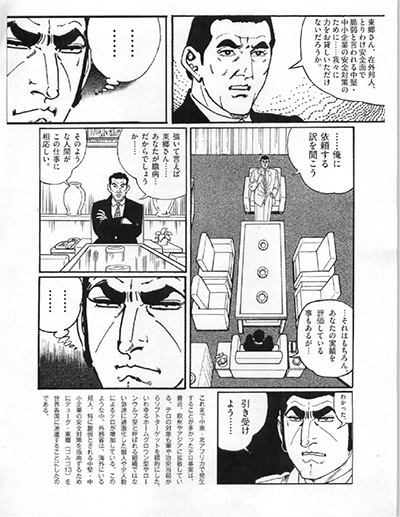

[quote from gekiga graphic novel]
“Mr. Togo, could you give us your help...”
Looking at the man straight in his eyes, the Foreign Minister began to speak as if he'd made up his mind and invited him to sit down with a gesture. The man that he had called Togo remained standing and wordlessly stared back at the Minister.
“...tell me why you need my help.”
Tension filled the Minister's room. Otherwise known as Golgo 13, Duke Togo's date of birth, age, and nationality are all unknown. All that is known is that he is a professional who never fails to complete the most difficult missions.
The Minister said with a measure of conviction.
“Mr. Togo, if I had to say, it could be because you are timid. That is the kind of person that we need for this job...”
Duke Togo continued to fix his gaze on the Minister as he resumed his silence. Was he trying to intimidate him, or was this his way of showing gratitude for the “compliment” that had been sent his way? Nobody knew. Then Togo murmured.
“Alright, I'll do it.”
Terrorism is no longer limited to the Middle East and Africa as it spreads to Europe and the United States, as well as Asia, where many Japanese are staying. Japanese are now not only being drawn into terrorist attacks but are actually being targeted.
In order to support Japanese businesses, particularly small and medium enterprises that comprise their bulk, on safety measures, the MOFA posts “Golgo13's Security guidelines for Japanese SMEs Abroad” on its website, in which Duke Togo, the main character in the gekiga graphic novel series “Golgo 13”, describes safety measures. Duke Togo, who has survived for half a century on the frontlines of a turbulent world, is also aware that he is as timid as a rabbit. The safety measures related by such a man is expected to be received by people involved in Japanese businesses with overwhelming impact and credibility. MOFA hopes that Golgo 13‘s Guidelines will be useful in enhancing the awareness and capability for “being responsible for your own safety” so that Japanese will not be harmed by any acts of terror. MOFA will continue to contribute to bolstering the safety measures of Japanese businesses people overseas through the effective distribution of information.
(note: Duke Togo is a fictional character in the gekiga graphic novel series “Golgo 13”).
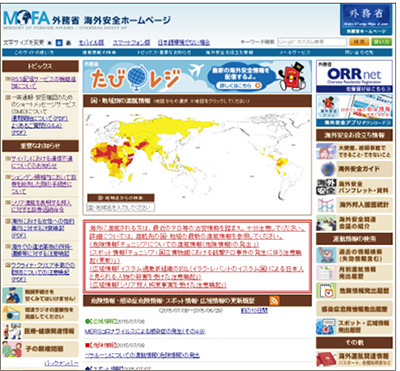 Overseas Safety Website (http://www.anzen.mofa.go.jp/) (in Japanese)
Overseas Safety Website (http://www.anzen.mofa.go.jp/) (in Japanese) MOFA “Overseas Travel Registration (“Tabi-Regi”)” (https://www.ezairyu.mofa.go.jp/tabireg/) (in Japanese)
MOFA “Overseas Travel Registration (“Tabi-Regi”)” (https://www.ezairyu.mofa.go.jp/tabireg/) (in Japanese)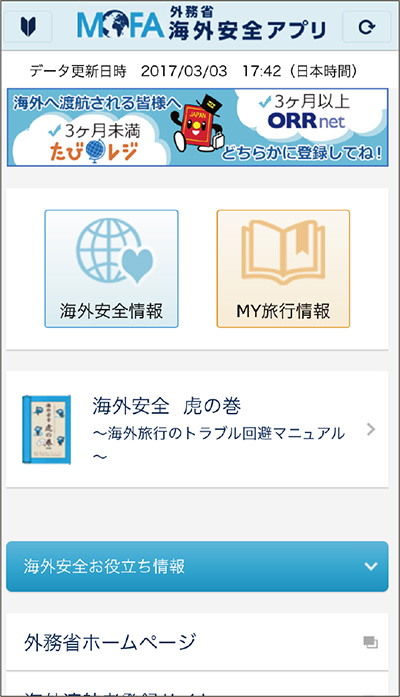 Download is available from MOFA Safety Application in Overseas Safety website “Kaigai Anzen Apuri no Haishin ni Tsuite (Overseas Safety Application
Download is available from MOFA Safety Application in Overseas Safety website “Kaigai Anzen Apuri no Haishin ni Tsuite (Overseas Safety Application
